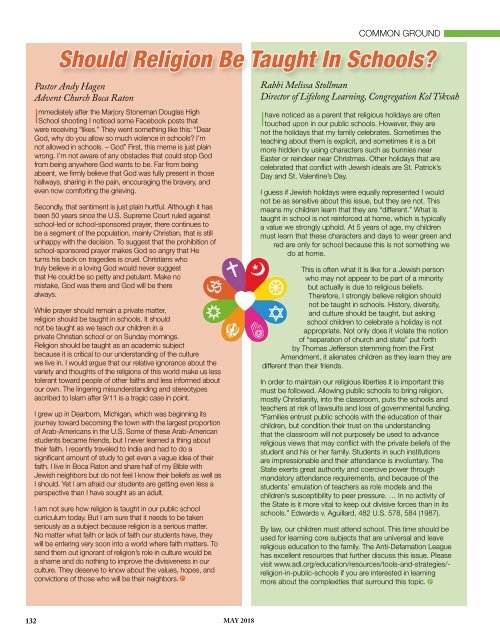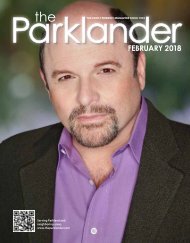May 2018
You also want an ePaper? Increase the reach of your titles
YUMPU automatically turns print PDFs into web optimized ePapers that Google loves.
Pastor Andy Hagen<br />
Advent Church Boca Raton<br />
mmediately after the Marjory Stoneman Douglas High<br />
I School shooting I noticed some Facebook posts that<br />
were receiving “likes.” They went something like this: “Dear<br />
God, why do you allow so much violence in schools? I’m<br />
not allowed in schools. – God” First, this meme is just plain<br />
wrong. I’m not aware of any obstacles that could stop God<br />
from being anywhere God wants to be. Far from being<br />
absent, we firmly believe that God was fully present in those<br />
hallways, sharing in the pain, encouraging the bravery, and<br />
even now comforting the grieving.<br />
Secondly, that sentiment is just plain hurtful. Although it has<br />
been 50 years since the U.S. Supreme Court ruled against<br />
school-led or school-sponsored prayer, there continues to<br />
be a segment of the population, mainly Christian, that is still<br />
unhappy with the decision. To suggest that the prohibition of<br />
school-sponsored prayer makes God so angry that He<br />
turns his back on tragedies is cruel. Christians who<br />
truly believe in a loving God would never suggest<br />
that He could be so petty and petulant. Make no<br />
mistake, God was there and God will be there<br />
always.<br />
While prayer should remain a private matter,<br />
religion should be taught in schools. It should<br />
not be taught as we teach our children in a<br />
private Christian school or on Sunday mornings.<br />
Religion should be taught as an academic subject<br />
because it is critical to our understanding of the culture<br />
we live in. I would argue that our relative ignorance about the<br />
variety and thoughts of the religions of this world make us less<br />
tolerant toward people of other faiths and less informed about<br />
our own. The lingering misunderstanding and stereotypes<br />
ascribed to Islam after 9/11 is a tragic case in point.<br />
I grew up in Dearborn, Michigan, which was beginning its<br />
journey toward becoming the town with the largest proportion<br />
of Arab-Americans in the U.S. Some of these Arab-American<br />
students became friends, but I never learned a thing about<br />
their faith. I recently traveled to India and had to do a<br />
significant amount of study to get even a vague idea of their<br />
faith. I live in Boca Raton and share half of my Bible with<br />
Jewish neighbors but do not feel I know their beliefs as well as<br />
I should. Yet I am afraid our students are getting even less a<br />
perspective than I have sought as an adult.<br />
I am not sure how religion is taught in our public school<br />
curriculum today. But I am sure that it needs to be taken<br />
seriously as a subject because religion is a serious matter.<br />
No matter what faith or lack of faith our students have, they<br />
will be entering very soon into a world where faith matters. To<br />
send them out ignorant of religion’s role in culture would be<br />
a shame and do nothing to improve the divisiveness in our<br />
culture. They deserve to know about the values, hopes, and<br />
convictions of those who will be their neighbors. P<br />
COMMON GROUND<br />
Should Religion Be Taught In Schools?<br />
Rabbi Melissa Stollman<br />
Director of Lifelong Learning, Congregation Kol Tikvah<br />
have noticed as a parent that religious holidays are often<br />
I touched upon in our public schools. However, they are<br />
not the holidays that my family celebrates. Sometimes the<br />
teaching about them is explicit, and sometimes it is a bit<br />
more hidden by using characters such as bunnies near<br />
Easter or reindeer near Christmas. Other holidays that are<br />
celebrated that conflict with Jewish ideals are St. Patrick’s<br />
Day and St. Valentine’s Day.<br />
I guess if Jewish holidays were equally represented I would<br />
not be as sensitive about this issue, but they are not. This<br />
means my children learn that they are “different.” What is<br />
taught in school is not reinforced at home, which is typically<br />
a value we strongly uphold. At 5 years of age, my children<br />
must learn that these characters and days to wear green and<br />
red are only for school because this is not something we<br />
do at home.<br />
This is often what it is like for a Jewish person<br />
who may not appear to be part of a minority<br />
but actually is due to religious beliefs.<br />
Therefore, I strongly believe religion should<br />
not be taught in schools. History, diversity,<br />
and culture should be taught, but asking<br />
school children to celebrate a holiday is not<br />
appropriate. Not only does it violate the notion<br />
of “separation of church and state” put forth<br />
by Thomas Jefferson stemming from the First<br />
Amendment, it alienates children as they learn they are<br />
different than their friends.<br />
In order to maintain our religious liberties it is important this<br />
must be followed. Allowing public schools to bring religion,<br />
mostly Christianity, into the classroom, puts the schools and<br />
teachers at risk of lawsuits and loss of governmental funding.<br />
“Families entrust public schools with the education of their<br />
children, but condition their trust on the understanding<br />
that the classroom will not purposely be used to advance<br />
religious views that may conflict with the private beliefs of the<br />
student and his or her family. Students in such institutions<br />
are impressionable and their attendance is involuntary. The<br />
State exerts great authority and coercive power through<br />
mandatory attendance requirements, and because of the<br />
students’ emulation of teachers as role models and the<br />
children’s susceptibility to peer pressure. … In no activity of<br />
the State is it more vital to keep out divisive forces than in its<br />
schools.” Edwards v. Aguillard, 482 U.S. 578, 584 (1987).<br />
By law, our children must attend school. This time should be<br />
used for learning core subjects that are universal and leave<br />
religious education to the family. The Anti-Defamation League<br />
has excellent resources that further discuss this issue. Please<br />
visit www.adl.org/education/resources/tools-and-strategies/-<br />
religion-in-public-schools if you are interested in learning<br />
more about the complexities that surround this topic. P<br />
132<br />
MAY <strong>2018</strong>

















